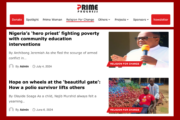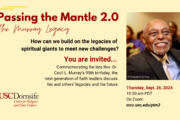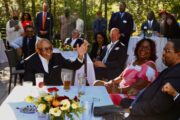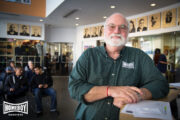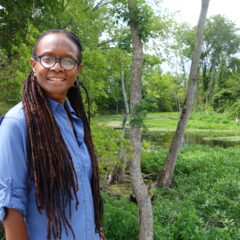As part of the USC Center for Religion and Civic Culture’s project on Engaged Spirituality, I have been able to work on four in-depth profiles of “spiritual exemplars,” people who work to advance human flourishing and are grounded in a religious or spiritual perspective. Along the way, I took part in the sacrifice of a cow for Eid al-Adha, had a conversation on a yacht on the Bodensee in the south of Germany and used the tools of digital ethnography to watch exemplars addressing women’s roles in interreligious dialogue in South Africa and Indonesia. I conducted a total of 21 interviews—totaling some 289 pages of printed transcripts—which I then coded and analyzed in order to produce the profiles. (Read Ken Chitwood’s profiles here.)
I applied to work on the project as a journalist, but I also have my doctorate in the ethnographic study of religion. The immersive nature of the fellowship and its journalistic demands led me to consider the crossover between ethnography and journalism more deeply. Based on my involvement in the project and drawing on research related to the overlap of ethnography and journalism—or “ethnographic journalism”—I suggest that practitioners in both fields might find ways to learn from one another and work together to better understand religious, cultural and social change around the globe.
Journalist and anthropologist Anne Kirstine Hermann coined the term “ethnographic journalism”—or “anthro-journalism” as some have called it—to highlight the use, and importance, of fieldwork by journalists. She wrote:
At a moment in time when multiculturalism poses evident challenges to the press and media, and trends require more contextual reporting, ethnographic journalism emerges in American feature journalism… characterized as the employment of immersion strategies adopted from social science for distinct storytelling purposes.
In her research, Hermann identified the differences between journalism and ethnography on epistemic, strategic and stylistic levels.
For example, whereas journalists might value fact- and event-driven stories, ethnographers would prefer interpretive, holistic and theoretical approaches. Where journalists might see their role as being detached narrators loyal to the public, ethnographers would see themselves as immersed, empathetic participants, loyal to their interlocutors. Although Hermann recognized how these modes and mechanisms of journalists and ethnographers are ideal types, they do speak to some of the fundamental—and sometimes opposed—differences between the respective fields’ norms, ethics and aesthetics.
Hermann suggested ethnographic journalism could emerge as a form of mediation between the two fields and, in turn, help address weaknesses in both—whether that be some of the ethical conundrums or positivistic assumptions that journalists are wary to wrestle with or the disconnect between ethnographers’ jargon and public understandings of the very issues researchers seek to elucidate.
I believe the concept of ethnographic journalism can help journalists mainstream new issues, ideas and personalities in their reporting. It will also help produce stories that are informative and yet not abstract, intelligent but heartfelt. On the other hand, more journalistic ethnographies can help ethnographers communicate their textured and nuanced findings to a wider audience. Sharing their research in a more journalistic fashion would allow them to contribute to religious literacy and create a robust space for the appreciation of religion as a potent force in the world today.
As collaborations and conversations continue, my hope is that both communities of practice might learn more about the norms, ethics and aesthetics of the other. By working together and gleaning postures and practices from one another, both can address the complex topic of “religion” with more nuance and texture.
A note from CRCC: Ken will be working with our team to explore the unique methodology of our project on engaged spirituality, which has worked with journalists to collect and tell the stories of 100 spiritual exemplars over the past few years. He will be in conversation with the team of journalists and researchers to further explore the lessons that both journalists and academics can take from working alongside each other.
Photo by Suzy Hazelwood from Pexels
Ken Chitwood is an affiliate with the USC Center for Religion and Civic Culture.


